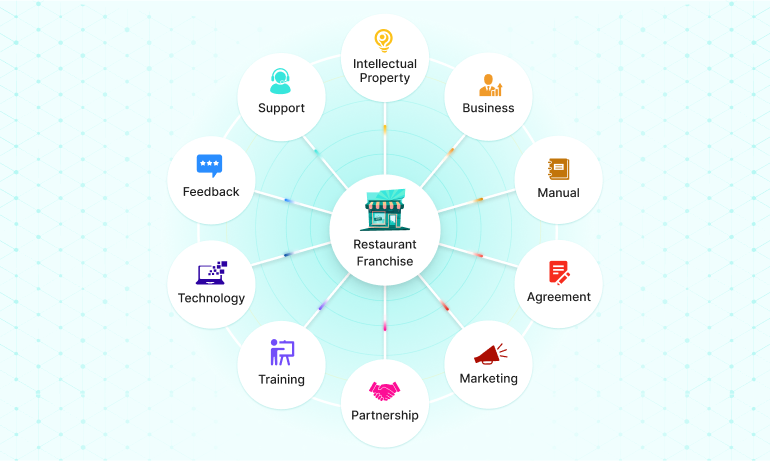If you’re an existing restaurant owner looking for a pathway to successful growth, franchising may be the way to go. By franchising your restaurant, you can expand your brand and reach in a relatively quick and efficient manner. However, before taking this leap, it’s crucial to assess the “franchisability” of your business to ensure it can be successfully replicated by others. Once you’ve determined that franchising is a viable option, it’s important to develop a robust business plan tailored specifically for your franchised business. Additionally, creating a franchise agreement and franchise disclosure document is essential to protect both the franchisor and franchisee. By developing an operational manual and providing strong support to franchisees, you can ensure consistent quality across all your locations. When it comes to selecting franchisees, be sure to carefully evaluate their fit with your brand to maintain the integrity of your concept. By following these steps and continuously monitoring and expanding your franchise network, you’ll be well on your way to achieving successful growth through franchising.
Franchising Your Restaurant: A Comprehensive Guide
Are you an existing restaurant owner looking for a successful strategy to expand your business? Franchising may be the answer for you. By turning your restaurant into a franchise, you can leverage your brand and expertise to penetrate new markets and achieve significant growth. However, before embarking on this journey, it is crucial to assess the “franchisability” of your business and develop a comprehensive plan to ensure the success of your franchised venture. In this article, we will guide you through the essential steps involved in franchising your restaurant and provide valuable insights to help you make informed decisions along the way.
This image is property of secure.gravatar.com.
Assessing Franchisability
Evaluate the uniqueness of your concept
Franchising a restaurant starts with evaluating the uniqueness of your concept. Is your restaurant offering something distinct and appealing to potential franchisees? Assess the market and competition to ensure that your concept stands out. Consider factors such as your cuisine, atmosphere, branding, and customer loyalty. If your concept is distinctive and has the potential to attract customers, it may be an excellent foundation for franchising.
Assess the viability of your business model for replication
Before franchising, you must evaluate the viability of your business model for replication. Consider if your restaurant’s operations can be standardized and streamlined to maintain consistency across multiple locations. Evaluate your suppliers, equipment, and processes to ensure that they can be replicated efficiently. A robust and scalable business model is essential for successful franchising.
Determine if your brand has market appeal for potential franchisees
Franchisees are investing in your brand and its potential for success. Assess the market appeal of your brand and the demand for your restaurant’s concept in potential franchising locations. Conduct market research to identify if there is a demand for your restaurant’s offerings and if potential franchisees would find your brand attractive. Understanding the market appeal will help you assess the potential success of franchisees and the growth of your franchise network.
Evaluate the profitability and scalability of your existing restaurant
Franchising should be based on a profitable and scalable business model. Evaluate the financial performance and profitability of your existing restaurant to determine if it has the potential to sustain growth through franchising. Consider factors such as profit margins, overhead costs, and customer demand. If your restaurant is profitable and can be scaled up, it provides a strong foundation for franchising.
Developing a Business Plan
To set your franchised business up for success, it is crucial to develop a robust business plan. This plan will serve as a roadmap for your franchise operation and provide a clear understanding of your growth objectives and strategies.
Identify your target market and competition
Identifying your target market and understanding the competition is essential for the success of your franchised business. Conduct detailed market research to identify potential locations for franchise expansion and analyze the competition in those markets. By understanding your target market and competition, you can tailor your strategies and position your franchise for success.
Outline your growth objectives and strategies
Clearly define your growth objectives and strategies in your business plan. Determine the number of franchise locations you aim to open within a specific timeframe and establish milestones for achieving your goals. Outline strategies for marketing, operations, and recruitment to support your growth objectives. Setting clear goals and strategies will guide your franchise expansion and keep you focused on your vision.
Determine the financial projections for your franchised business
Developing accurate financial projections is a critical component of your business plan. Determine the estimated costs of opening and operating a franchised location, such as franchise fees, equipment costs, and ongoing royalties. Additionally, project expected revenue based on your existing restaurant’s performance and market research. Financial projections will help you understand the potential return on investment for both you and your franchisees.
Define the resources and support required for successful growth
Franchisees rely on your support and resources to succeed. Define what resources and support you will provide to your franchisees to ensure their success. This may include initial training programs, ongoing operational support, marketing assistance, and access to industry resources. Clearly defining the support system in your business plan will attract potential franchisees and set a strong foundation for growth.

This image is property of get.apicbase.com.
Creating Franchise Documents
As a franchisor, you have a legal obligation to provide franchisees with the necessary documents that outline the terms and conditions of the franchise relationship.
Draft a comprehensive franchise agreement
A franchise agreement is a legally binding contract that outlines the rights and obligations of both the franchisor and the franchisee. Work with a legal professional experienced in franchising to draft a comprehensive franchise agreement that covers all aspects of the franchise relationship. This includes factors such as territory, fees, intellectual property rights, and termination provisions. A well-drafted franchise agreement ensures clarity and protects the interests of both parties.
Include the necessary legal and financial disclosures in the franchise disclosure document
The franchise disclosure document (FDD) provides detailed information about the franchise opportunity to potential franchisees. It includes essential disclosures required by law, such as the franchisor’s background, financial performance representations, fees, litigation history, and more. Ensure that your FDD includes all the necessary disclosures to comply with local and national franchising regulations. Consult with a legal professional to create an informative and compliant FDD.
Ensure compliance with local and national franchising regulations
Franchising is regulated by both local and national laws. Ensure that your franchise documents and practices comply with all applicable regulations. This includes registration requirements, disclosure obligations, and any specific regulations governing franchising in your jurisdiction. Compliance with franchising regulations is crucial to protect your franchise network and maintain the trust of your franchisees.
Seek legal advice to protect your brand and intellectual property
Your brand and intellectual property are valuable assets that need protection. Consult with a legal professional who specializes in intellectual property and franchising to safeguard your brand. They can assist with trademark registration, copyright protection, and developing strategies to enforce your intellectual property rights. Protecting your brand and intellectual property ensures the long-term success and exclusivity of your franchise network.
Developing an Operational Manual
An operational manual is crucial for maintaining consistency and ensuring that franchisees follow your established standards.
Document your restaurant’s standard operating procedures
Develop a comprehensive operational manual that documents your restaurant’s standard operating procedures (SOPs). Include step-by-step instructions for all aspects of operations, such as food preparation, inventory management, customer service, and staff management. SOPs ensure consistency across franchise locations and help franchisees understand and replicate your restaurant’s operations effectively.
Include recipes, quality control processes, and branding guidelines
In addition to SOPs, include recipes, quality control processes, and branding guidelines in your operational manual. Consistency in the taste and quality of food is crucial for maintaining your brand’s reputation. Provide detailed recipes and instructions to ensure that franchisees can replicate your menu items accurately. Define quality control processes to maintain consistent standards and outline branding guidelines to ensure uniformity in branding and customer experience across all franchise locations.
Provide clear instructions for franchisees to maintain consistency across locations
Clear instructions are essential for maintaining consistency across franchise locations. Your operational manual should provide franchisees with clear guidelines on maintaining the same level of service, quality, and brand identity that your existing restaurant offers. This includes guidelines for staff hiring and training, food sourcing, marketing initiatives, and customer engagement. Clear instructions empower franchisees to replicate your success and maintain a consistent brand image.
Update and refine the operational manual regularly
The restaurant industry is dynamic, and it is essential to keep your operational manual updated and relevant. Regularly review and refine your operational manual to reflect changes in best practices, industry trends, and customer preferences. Solicit feedback from franchisees and incorporate their insights to enhance the operational manual. By keeping your manual up to date, you ensure that franchisees have the most current tools and guidelines for success.

This image is property of blogassets.7shifts.com.
Building a Support System
Successful franchise operations require a strong support system to guide and assist franchisees in achieving their goals.
Establish a dedicated franchise support team
A dedicated franchise support team is essential for providing ongoing guidance and support to franchisees. Assemble a team with expertise in different areas, such as operations, marketing, training, and finance. These individuals will be the primary point of contact for franchisees, addressing their concerns, providing guidance, and helping them overcome challenges. Establishing a dedicated support team ensures that franchisees receive the assistance they need to succeed.
Provide ongoing training and guidance to franchisees
Franchisees rely on your expertise to navigate the challenges of operating a restaurant. Offer comprehensive training programs to new franchisees, covering all aspects of operations, customer service, and management. Additionally, provide ongoing guidance and mentorship to franchisees, helping them improve their skills and address specific challenges. By investing in their development, you empower franchisees to become successful business owners who contribute to the overall growth of your franchise network.
Offer marketing support and materials for local advertising
Marketing support is crucial for franchisees to attract customers and establish their presence in their local markets. Develop marketing strategies and provide marketing materials tailored to each franchise location’s needs. This includes digital and traditional advertising materials, social media strategies, and brand-approved campaigns. By offering marketing support, you help franchisees leverage your brand’s recognition and gain a competitive edge in their local markets.
Create a communication channel for franchisees to share best practices
Encourage collaboration and knowledge sharing among franchisees by creating a communication channel. This can be a dedicated online platform, regular meetings, or regional conferences. This platform allows franchisees to share best practices, success stories, and challenges and learn from one another. By fostering a sense of community and collaboration, franchisees can benefit from collective wisdom and adapt successful strategies for their own locations.
Determining Franchise Fee Structure
Establishing a fair and transparent franchise fee structure is crucial for the financial success of both franchisor and franchisee.
Research industry standards and benchmark your franchise fee
Research the industry standards and evaluate the franchise fees charged by other successful franchisors in your industry. Benchmark these fees against the services and support you provide to franchisees. Ensure that your franchise fee is competitive, aligning with the value you offer and the potential return on investment for franchisees. Conducting thorough research will help you strike the right balance between profitability and affordability.
Consider royalty fees or ongoing revenue-sharing models
Beyond the initial franchise fee, consider additional revenue streams such as royalty fees or ongoing revenue-sharing models. Royalty fees are a percentage of sales that franchisees pay to the franchisor on a regular basis. Revenue-sharing models involve sharing a portion of the franchisee’s profits with the franchisor. These additional fees can provide ongoing revenue for franchisors while ensuring a mutually beneficial partnership with franchisees.
Balance profitability for both franchisor and franchisee
The franchise fee structure should strike a balance between profitability for both the franchisor and the franchisee. While it is essential to generate revenue for the franchisor, the fee structure should also allow franchisees to achieve profitability and return on their investment. Consider the cost structure of your franchise system, ongoing support costs, and the potential profit margins for franchisees. A fair and balanced fee structure will attract qualified franchisees and foster long-term sustainability.
Ensure transparency in the fee structure
Transparency is crucial in the franchise fee structure to build trust and maintain a healthy franchisor-franchisee relationship. Clearly communicate all fees and their purposes to potential franchisees in your franchise disclosure document (FDD). Provide a breakdown of the initial franchise fee, ongoing fees, and any additional costs. By being transparent, you establish credibility and demonstrate that you value open and honest communication with your franchisees.

This image is property of www.posist.com.
Marketing Your Franchise
Marketing plays a vital role in attracting potential franchisees and creating awareness about your franchise opportunity.
Develop a compelling franchise marketing strategy
A well-crafted franchise marketing strategy can effectively communicate the benefits and potential of your franchise opportunity to potential franchisees. Define your unique selling proposition and target audience, and develop marketing messages that highlight the advantages of your franchise system. Use various marketing channels such as digital advertising, content marketing, and search engine optimization to maximize your reach and appeal to potential franchisees.
Utilize digital marketing channels to reach potential franchisees
Digital marketing channels provide an effective platform to reach potential franchisees. Establish a strong online presence through a professional website that showcases your brand, success stories, and franchise opportunity. Leverage social media platforms to engage with potential franchisees, provide valuable content, and build relationships. Utilize targeted online advertising to reach individuals who meet your ideal franchisee profile. Digital marketing allows you to reach a wide audience and generate leads efficiently.
Highlight the benefits and success of your existing restaurant
One of the most compelling arguments for potential franchisees to join your franchise network is highlighting the benefits and success of your existing restaurant. Showcase your restaurant’s achievements, such as awards, positive reviews, and customer loyalty. Share success stories of existing franchisees and their profitability. By highlighting the benefits and success of your restaurant, you create a compelling case for potential franchisees to join your franchise network.
Attend franchise exhibitions and trade shows to generate leads
Franchise exhibitions and trade shows provide excellent opportunities to network with potential franchisees and generate leads. Participate in industry-specific events where you can showcase your franchise opportunity and interact directly with individuals interested in franchising. Create visually appealing displays, provide informative materials, and engage in meaningful conversations to attract potential franchisees. Attending these events exposes your franchise opportunity to a targeted audience and increases your chances of finding qualified franchisees.
Selecting Franchisees
Selecting the right franchisees is crucial for the success and growth of your franchise network.
Define your ideal franchisee profile based on skills and values
Establish clear criteria for your ideal franchisee based on both skills and values. Consider qualities such as business acumen, leadership skills, and a passion for your industry. Define the values and principles that align with your brand and ensure potential franchisees share those values. By identifying the traits of an ideal franchisee, you can focus your recruitment efforts on individuals who are likely to succeed in your franchise system.
Conduct a thorough screening and interview process
Screen potential franchisees rigorously to ensure they meet your criteria and have the capabilities to operate a successful franchise. Conduct in-depth interviews to assess their business experience, financial capability, and commitment to your brand. Ask for references and conduct background checks to gain a comprehensive understanding of the candidate’s qualifications. A thorough screening process helps mitigate risks and ensures that only qualified individuals become your franchisees.
Assess the financial capability of potential franchisees
Financial stability is a critical factor for franchisees’ success. Assess the financial capability of potential franchisees by considering factors such as their net worth, liquidity, and credit history. Evaluate their ability to meet the financial requirements of opening and operating a franchise location. Financial stability ensures that franchisees can sustain their business and contribute to the overall growth of your franchise network.
Ensure alignment with your brand’s vision and values
Franchisees are brand ambassadors, and their alignment with your brand’s vision and values is crucial. Assess if potential franchisees share the same passion and enthusiasm for your brand’s mission. Evaluate their commitment to providing a consistent customer experience and upholding your brand’s reputation. Ensuring alignment with your brand’s vision and values will create a strong foundation for a successful partnership between franchisor and franchisee.

This image is property of www.consulttogrow.com.
Facilitating Training and Support
Franchisees require training and ongoing support to succeed in operating your franchised business.
Develop a comprehensive training program for new franchisees
A comprehensive training program is essential for new franchisees to understand and effectively operate your franchised business. Develop a structured training curriculum that covers all aspects of operations, customer service, brand standards, and management. This can include classroom training, on-the-job training, and mentorship programs. By providing comprehensive training, you empower franchisees with the knowledge and skills they need for success.
Offer ongoing support and mentoring for franchisees
Ongoing support is crucial to guide franchisees as they navigate the challenges of running a restaurant. Establish regular communication channels and provide ongoing mentorship to address franchisees’ concerns, provide guidance, and offer solutions to operational challenges. This support system should be accessible for franchisees to seek assistance whenever they need it, fostering their growth and ensuring their success.
Provide access to industry resources and best practices
Franchisees benefit from having access to industry resources and best practices. Share your expertise, industry insights, and successful strategies with franchisees, helping them stay ahead of the competition. Collaborate with industry experts and develop partnerships to provide franchisees with additional resources, such as training materials, market research, and technological tools. By offering valuable resources, you position your franchisees for success and foster continuous improvement in your franchise network.
Encourage collaboration and networking among franchisees
Franchisees can learn from one another’s experiences and share best practices. Encourage collaboration and networking among franchisees through regular meetings, online forums, or regional conferences. Provide platforms for franchisees to connect, share insights, and build relationships. By fostering a collaborative environment, franchisees can learn from each other’s successes and challenges, fueling their growth and contributing to the overall success of your franchise network.
Monitoring and Expanding the Franchise Network
Monitoring franchisee performance and strategically expanding your franchise network are vital for sustained growth.
Establish performance metrics to evaluate franchisee success
Establish performance metrics to evaluate the success of individual franchisees and the overall health of your franchise network. Key performance indicators (KPIs) can include revenue growth, customer satisfaction scores, employee turnover rates, and profitability. Regularly track and analyze these metrics to identify areas for improvement and provide targeted support to underperforming franchisees. Monitoring franchisee performance allows you to maintain quality standards and drive growth within your network.
Conduct regular audits and inspections to maintain quality standards
Maintaining consistent quality across your franchise network is crucial for your brand’s reputation. Conduct regular audits and inspections to ensure that franchisees are meeting your brand’s standards and following operational guidelines. These evaluations can include inspections of cleanliness, food safety practices, customer service, and adherence to branding guidelines. By upholding quality standards, you protect your brand’s reputation and maintain customer satisfaction.
Identify opportunities for new franchise locations
Continued growth requires identifying and capitalizing on opportunities for new franchise locations. Conduct market research and feasibility studies to identify markets with a demand for your restaurant’s concept. Consider factors such as population density, consumer demographics, and competition. Identify suitable locations and develop strategies for expansion, such as targeted marketing campaigns and recruitment efforts. Identifying viable opportunities allows you to strategically expand your franchise network and maximize growth potential.
Strategically expand your franchise network for sustained growth
When expanding your franchise network, focus on quality over quantity. Select franchisees who align with your brand’s vision and values, have the necessary qualifications, and the financial capability to succeed. Be selective in choosing new locations to ensure they have the potential for success and fit within your growth objectives. By strategically expanding with the right franchisees and locations, you lay the foundation for sustained growth and long-term success.
Franchising your restaurant can be an exciting and rewarding journey. By assessing the “franchisability” of your business, developing a comprehensive business plan, creating franchise documents, building a support system, marketing your franchise, selecting the right franchisees, facilitating training and support, and monitoring and expanding your franchise network, you can set your franchise up for success. Remember, franchising requires careful planning, ongoing support, and a commitment to maintaining quality standards. With the right strategies in place, you can achieve significant growth and establish a thriving franchise network.
If you are an existing restaurant owner considering franchising, we hope this comprehensive guide has provided valuable insights and guidance. With careful planning, hard work, and a commitment to excellence, franchising your restaurant can be a successful strategy for growth and long-term success. Good luck on your franchising journey!
